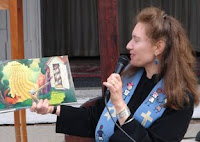 :
: If you want to build a ship, don't drum up people to collect wood and don't assign them tasks and work, but rather teach them to long for the endless immensity of the sea.
—Antoine de Saint-Exupery
The image of our "First Parish Church" — shown on the right — is from early October, so it's not the Wintery snow banks that I saw there today. But I like this image because it shows the changing of the seasons — just like we were doing today with Elea's sabbatical.
Below is the Rumi poem, read by Becky Pine during the Chalice lighting today.
| Everywhere, something begins to arrive every soul is seeking truth; every soul parched with thirst they've all heard the voice of the quencher of thirst everyone tastes the love, everyone tastes the milk anxious to know from where wisdom begins to arrive waiting in fever; wondering ceaselessly when will that final union begin to arrive people of all beliefs raising their hands to the sky their chanting voices in unison begin to arrive how happy is the one whose heart's ear hears that special voice as it begins to arrive clear your ears, my friend, from all expectations so you can hear the sound as it begins to arrive if your eyes are marred with petty visions wash them with tears your teardrops are healers as they begin to arrive keep silence, don't rush to finish your poem the finisher of the poem, the creator of the word, will begin to arrive —Rumi, 13th-century poet | Becky's poem opened my mind to listening for and really hearing "The Voice of the Water" — the metaphor we have chosen to symbolize our congregation's quest for spiritual rejuvenation which we will be doing over the next four months during Elea's sabbatical. Ever since I first read Hermann Hesse's Siddhartha as a teenager, appreciating the sound of the water (and the wind, and most of nature)... have brought me closer to my true inner self. So I'm totally on board with this metaphor!!  As background for this journey, I offer an audio-made-into-video of Rev. Elea's sermon on "Grace". Described also in my sister Nanci's "Gifts of Grace" blog, click on Part 1, Part 2, or Part 3 of "The Breath of Something Incomprehensible", divided into clips solely due to YouTube size limitations. As background for this journey, I offer an audio-made-into-video of Rev. Elea's sermon on "Grace". Described also in my sister Nanci's "Gifts of Grace" blog, click on Part 1, Part 2, or Part 3 of "The Breath of Something Incomprehensible", divided into clips solely due to YouTube size limitations. |


1 comment:
I came across the utube video/sermon about Grace that you posted, it was beautiful. Below is a page from Walden, it always reminds me of Grace:
[19] A single gentle rain makes the grass many shades greener. So our prospects brighten on the influx of better thoughts. We should be blessed if we lived in the present always, and took advantage of every accident that befell us, like the grass which confesses the influence of the slightest dew that falls on it; and did not spend our time in atoning for the neglect of past opportunities, which we call doing our duty. We loiter in winter while it is already spring. In a pleasant spring morning all men's sins are forgiven. Such a day is a truce to vice. While such a sun holds out to burn, the vilest sinner may return. Through our own recovered innocence we discern the innocence of our neighbors. You may have known your neighbor yesterday for a thief, a drunkard, or a sensualist, and merely pitied or despised him, and despaired of the world; but the sun shines bright and warm this first spring morning, recreating the world, and you meet him at some serene work, and see how it is exhausted and debauched veins expand with still joy and bless the new day, feel the spring influence with the innocence of infancy, and all his faults are forgotten. There is not only an atmosphere of good will about him, but even a savor of holiness groping for expression, blindly and ineffectually perhaps, like a new-born instinct, and for a short hour the south hill-side echoes to no vulgar jest. You see some innocent fair shoots preparing to burst from his gnarled rind and try another year's life, tender and fresh as the youngest plant. Even he has entered into the joy of his Lord. Why the jailer does not leave open his prison doors — why the judge does not dismis his case — why the preacher does not dismiss his congregation! It is because they do not obey the hint which God gives them, nor accept the pardon which he freely offers to all.
Thoreau
Thanks,
~Carla
Post a Comment